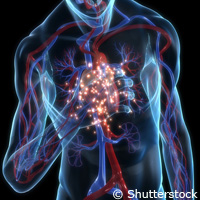Scientists find link between heart ruptures and heart attacks
Scientists in Belgium, the Netherlands and the United States have identified a single protein called the CaM kinase that plays a role in the biochemical cascade that triggers a cardiac rupture. The findings shed light on how blocking the biochemical processes kick-started by the aldosterone hormone could prevent cardiac ruptures once a heart attack happens. The study, presented in the journal Nature Medicine, was funded in part by the MEDIA ('The metabolic road to diastolic heart failure') project, which is backed with almost EUR 12 million under the 'Health' Theme of the EU's Seventh Framework Programme (FP7). Led by the University of Iowa in the United States, the scientists propose that blocking this protein could protect a person from cardiac rupture, and thus increase their chances of survival. When a person suffers a heart attack, various chemicals are generated, triggering biological processes that contribute to healing and repair. The problems start when many of these chemical signals become 'too much of a good thing' and ultimately cause more damage, resulting in heart failure and sudden death. 'Two of the medicines that are most effective for heart failure are beta-blockers [that] block the action of adrenaline, and drugs that block the angiotensin receptor,' says Professor Mark E. Anderson from the departments of Internal Medicine and of Molecular Physiology and Biophysics at the University of Iowa, the senior author of the study. 'The third tier of therapy is medication that blocks the action of aldosterone.' Levels of aldosterone rise in patients after they've suffered a heart attack. Experts have linked higher levels of this hormone with an increased risk of dying in the days immediately following a heart attack. Higher levels of aldosterone are also linked with an increase in oxidation in heart muscle. Professor Anderson and his colleagues discovered three years ago that oxidation stimulates CaM kinase. They also found that CaM kinase is a lynchpin in the beta-blocker and angiotensin pathways. 'We wondered if aldosterone might somehow work through CaM kinase and, if it did, [whether] some of the benefits of aldosterone blockers [could] be attributed to effects on CaM kinase,' Professor Anderson explains. In this latest study, the researchers evaluated how higher aldosterone levels adversely impact heart muscle after a heart attack, and how CaM kinase is a contributing factor. Their work showed how CaM kinase stimulated the cells of the heart muscle to generate an enzyme called MMP9 that is involved in the rupture of the heart. 'Although there are many sources of this enzyme, our study showed that heart muscle itself is actually making this protein too and is acting against its own self-interest in doing so,' Professor Anderson explains. 'We don't know why it happens, but inhibiting CaM kinase can prevent it. We think our study provides experimental evidence for why that should work. The findings enhance excitement that CaM kinase might be an important therapeutic target in heart disease, and developing CaM kinase inhibitors is a major goal for us so that we can move this from experimental findings to clinical testing.' Experts from the University of Leuven in Belgium and Maastricht University in the Netherlands contributed to this study.For more information, please visit: Nature Medicine: http://www.nature.com/nm/index.html(opens in new window) FP7 Research in Health: http://cordis.europa.eu/fp7/health/(opens in new window) University of Iowa: http://www.uiowa.edu/(opens in new window)
Countries
Belgium, Netherlands, United States



